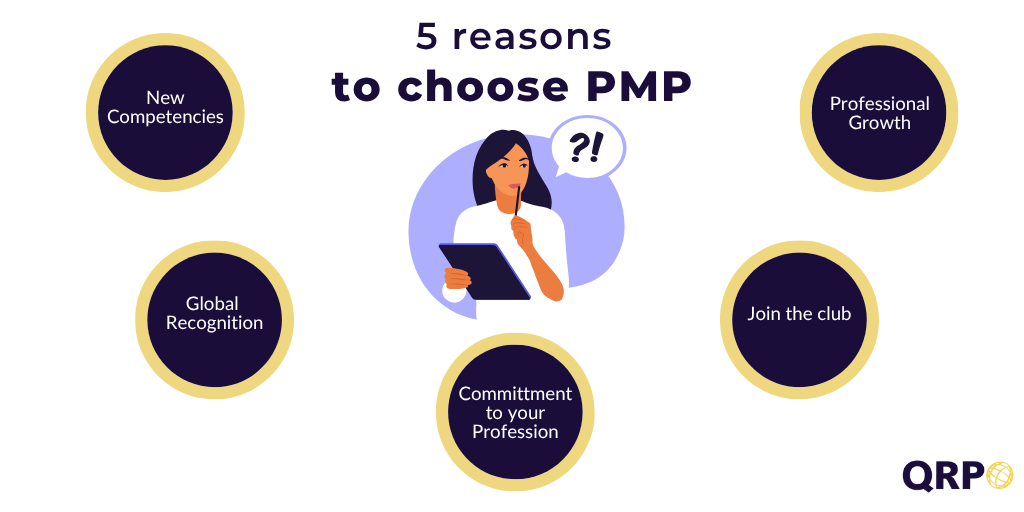Categories
Tags
Newsletter
Subscribe to the QRP International neswletter and get all the news on trends, useful contents and invitations to our upcoming events
Subscribe
PMP® stands for Project Management Professional and is considered the golden standard for project management. The certification, provided by PMI (Project Management institute) is recognized worldwide.
The certification requests a real commitment and proven experience within the world of project management. Once certified, professionals have more possibilities in the workforce and to take the next step in their career. The organisation will also benefit from an employee that is PMP certified, as it brings lots of knowledge and experience.
The PMP certification is informed by the PMBOK® Guide (Project Management Body of Knowledge), among other resources. Developed and periodically updated by the Project Management Institute (PMI), the PMBOK® Guide outlines generally accepted project management principles and practices. While it remains an important reference, the PMP exam is primarily based on the PMP Examination Content Outline, which reflects current industry roles and expectations.
The certification process of the PMP certification requests a time-investment and covers a lot of topics. The certification process requires dedication. However, also the benefits speak for themselves, both for the individual and the organisation. We listed the 5 main benefits:

The PMP certification scheme includes many new learnings. It covers both technical skills as soft skills, and prepares the participant to be an all round Project Manager.
PMP is universally recognised. PMP is global and the learned techniques and skills can be applied to all sorts of projects. PMP is industry independent.
To be able to write ‘PMP’ behind your name, will show your colleagues, managers and recruiters that you take your profession very seriously. It shows that you are up to date regarding the latest project management developments and that you are eager to learn and constantly develop yourself.
Globally there are about a million PMP certified professionals. PMI regularly organises events for these professionals to increase networking possibilities. But there are also many other online and offline communities where PM related topics are being discussed.
The PMP certification increases your chances of career growth and salary increase.
The 8 performance domains summarize which elements are essential to the success of a project:
The performance domains focus on delivering value to the organisation and its stakeholders through the project delivery.
The PMBOK also defines 12 Project Management Principles, which are:
With these 12 principles, the PMBOK wants to specify how processes and behaviour in project delivery play their roles. These principles can be guiding for project managers and act like the rules for the entire project management process.
There are many methods and certifications in the world of project management, PMP® and PRINCE2® being the best known. Choosing the right one for you and your organisation can be difficult. We often get questions about the difference between the two certifications, that’s why we’ve compared the two methods. Read our article PMP® vs PRINCE2® to learn more about the differences between these methodologies.
To be able to take the PMP certification exam, there are some basic requirements you must meet. PMI wants to keep the level high and therefore requires that the candidate must have led projects for 36 or 60 months (depending on previous education). It is also a must that the candidate has followed 35 hours of project management education with a PMI Authorised Training Partner (ATP).
QRP International is an ATP for PMP, our PMP Exam preparation courses are fully accredited by PMI. We’re authorised to deliver PMP training courses virtual or on-site.
The PMP certification also requires self study in addition to formal training. Depending on your project management experience, we recommend scheduling the exam about three to six months after beginning your preparation. Download our infographic 5 Tips to get the PMP Certification to learn all our exam tips!
Once you have passed the exam and are an official Project Management Professional, you will have to maintain your certification. PMP holders are required to earn 60 professional development units (PDUs) in each 3-year cycle to maintain a PMP certification
Interested to learn more about PMP? Watch the recording of our webinar with Xavier Heusdens and find out why it is worth it to invest in the PMP certification.